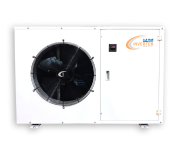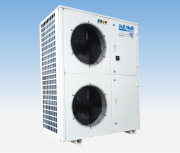Commercial condensing units (CCUs) are an important part of the in-store refrigeration mix. Digital control and inverter-driven CCUs can give supermarkets and convenience stores the edge on their rivals if they are looking – and they should make this a top priority – to drive down their energy costs. Both technologies can reduce refrigeration-related energy bills by as much as 20 to 30 per cent. These are savings that the management cannot afford to miss out on.
Food stores are some of the biggest energy users in the country and as energy prices soar and net zero targets loom the challenge to make savings grows. With fridges and freezes working overtime all-year round – and doubly hard as our summers grow hotter – supermarkets large and small are desperate to find more ways to reduce their bills. Refrigeration uses the most energy in a supermarket so savings here can make the biggest difference.
Energy efficiency has never had a bigger role to play in supermarkets, convenience stores and out of town retail outlets than it does today. Recently rising energy costs have presented the industry with some of its toughest challenges so saving energy and keeping costs down in-store remain a high priority in this sector if it is to meet the future with confidence.
The Government wants us all to look at making energy savings – whether it’s in business or on the domestic front. Finding more sustainable ways to manage in-store refrigeration and save energy at the same time is now playing a key role in the food supply chain. Customers are also demanding that stores travel along the green route as they too look to lower their carbon footprint.
 Commercial condensing units (CCUs) are an important part of the in-store refrigeration mix. Digital control and inverter-driven CCUs can give supermarkets and convenience stores the edge on their rivals if they are looking – and they should make this a top priority – to drive down their energy costs. Both technologies can reduce refrigeration-related energy bills by as much as 20 to 30 per cent. These are savings that the management cannot afford to miss out on.
Commercial condensing units (CCUs) are an important part of the in-store refrigeration mix. Digital control and inverter-driven CCUs can give supermarkets and convenience stores the edge on their rivals if they are looking – and they should make this a top priority – to drive down their energy costs. Both technologies can reduce refrigeration-related energy bills by as much as 20 to 30 per cent. These are savings that the management cannot afford to miss out on.
With refrigerated cabinets with fitted doors now being the norm the need for condensing units to have greater flexibility on load matching is high because refrigeration load can vary considerably during a 24-hour period in a store. Customers opening and closing cabinet doors will have a significant effect on the efficiency of the system.
Having the ability to vary the load can make a real difference to the operation. Matching load demand cuts energy consumption, eases pressure on the equipment and improves stored product quality. This is where digital and inverter technology comes into its own and really makes a difference.
Both methods of varying the cooling capacity of the condensing unit stabilises the storage space temperature. This maximises product life and quality and at the same time ensures that the equipment only works hard when or at a level it needs to, so guaranteeing energy savings. Whatever size of store operation, saving energy is the quickest and most effective way to cut outgoings and being ambitious can pay dividends.
Both digital and inverter technology will make a huge difference to your outgoings whether it be a small corner shop, a convenience store chain of 100 plus units or a large supermarket. J & E Hall Fusion Scroll Commercial Condensing Units with their highly reliable scroll compressor offer full inverter control up to 25.7kW.
 They also feature an oil return cycle/management and have external service valves, liquid line drier and sight glass. Hinged access doors make maintenance easy for the contractor. With small footprints, these low noise CCUs are perfect in locations where space is tight and residents are living nearby.
They also feature an oil return cycle/management and have external service valves, liquid line drier and sight glass. Hinged access doors make maintenance easy for the contractor. With small footprints, these low noise CCUs are perfect in locations where space is tight and residents are living nearby.
The J & E Hall Inverter driven units like the single and twin digital scroll CCU range, are suitable for multi-cabinet systems and multiple evaporators for cold rooms. Choosing the right refrigerant is also a key aspect of managing in-store systems. Our units can operate on low GWP refrigerants R448A and R449A.
The big challenge to reduce energy bills will not go away and will continue to grow larger but by employing digital and inverted-based technology installers are giving the supermarket and convenience store industries a helping hand on the road to making savings.
https://commercial.jehall.co.uk/